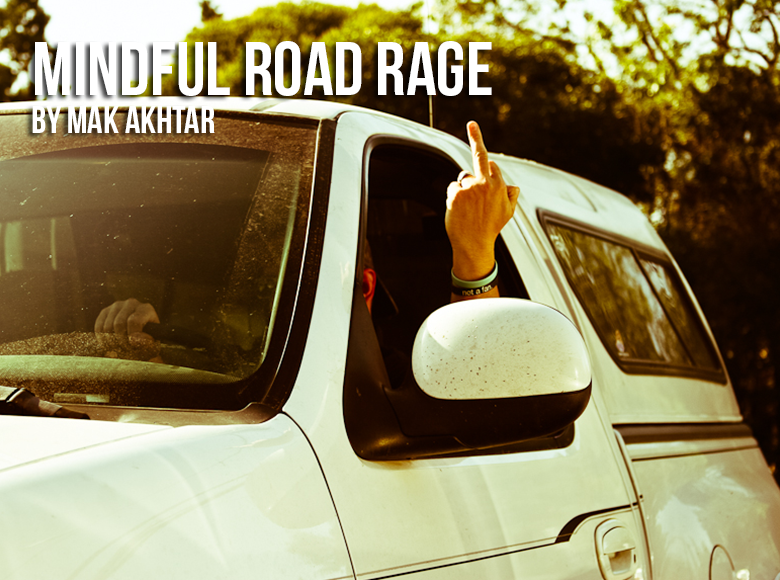Once upon a time, I drove around in circles in a Kaiser parking lot bawling my eyeballs out, thanks to an old man who had no a clue just how terribly he had impacted me emotionally. I had already spilled my morning smoothie, was running late to an appointment, and had a conference to prep for the next day.
Like everyone else, I was desperately searching for parking and finally found someone leaving fair and square. Unfortunately, I had to torturously watch a seemingly evil old man slowly steal my spot, pretending I wasn’t there honking at him, staring aghast at the injustice of it all. One last hand-on-the-horn-for-15-seconds only earned me the bird for my efforts to take back justice. And only resulted in the flood gates bursting open instantly. Once I managed to calm down, I tried to justify my overemotional reaction after reigning in my thoughts of how cruel and, well, fucked-up people can be. I was ready to get that old man and his little dog, too
Here’s something everyone can relate to: road rage. Just pure, unadulterated everyone-out-of-my-mother… fatherbrothersister’s-way road rage.
I don’t know what it is about people who drive like maniacs / fools / donkey riders in the tenth century… but nothing riles me up faster than being cut off by someone (read: idiot on wheels) who doesn’t have the decency to pick up the pace when they get in the lane that is rightfully yours. Isn’t that what it feels like? The thirty-foot space in front of your vehicle belongs to you! It has your name carved into it. I get so territorial and deranged; I start tailing them, revving the little engine of my not-so-souped-up two-door manual Civic and I’m so damn pleased with myself when I finally overtake the shit out of them, sneak over with a dirty look, and show them who’s boss. (Cue a war cry followed by your choice of ‘EAT MY DUST, SPARKY!’ or ‘JUSTICE!’ or ‘This is SPARTAAAA!’)
But what happens when you are desperate to be constantly zen like me? When you judge yourself every time you get irritated, because you have a reputation for being a meditator and working at a center for compassion? I’ve been doing that for nearly eight years now (the meditation bit; the compassion gig for two), and only in the last few years have I touched upon the tip of the iceberg of something I like to call “Mindful Road Rage.” The road is truly is the best place to practice mindfulness—and by that I don’t mean you start meditating while driving. (My old research professor says she ‘meditates with her eyes open’ for her grueling two-hour commutes—much to my horror for her safety.) What I mean is realizing your supremely bizarre emotional anger every time you feel wronged on the road, before you begin to act like that a-hole on the road yourself (everyone in a Beamer—I’m looking at YOU! Including my friend Ari. The stereotype is there for a reason…!).
Of course, as I was thinking of this article, someone (an idiot so to speak) cut me off and I had immediate road rage Tourette’s and cursed out loud in what is known as Unglish (Urdu English—the language would warrant too many horrified gasps and therefore will be withheld. My mother knows I blog, okay?)
So why does this matter? Why in the holy name of Thom Yorke’s exceptional dance skills would you want to be mindful about your road rage? Why should you and whose army care?
Well firstly, not everyone can be as special as you, driving like they’re Han Solo in the Millennium Falcon in an asteroid field. Damn these inferior X-wing drivers. But guess what? The only person whom this negatively affects is actually you. The person who just cut you off most likely has no clue. And it’s unlikely they’ll become a better driver because you go off blaring your horn at them. You’ll probably startle them shitless and make them more of a liability on the road.
It can also be hard to see a person in a vehicle as a human being with loved ones… I know I just see a damn box on wheels. Similar to how it’s harder to relate over a computer or phone screen: we’re wired to read body language and voice tones. So it’s easy to get caught up and be obnoxious. Perhaps the metal body surrounding them, like a Power Ranger on wheels, sucks a little bit of the humanity out of them? Bold and a little out there, but something to consider.
Another reason is… science. Our flight-or-fight response is best reserved for fighting off wild beasts. It hasn’t evolved to deal with first-world problems just yet because we change shit too fast and too well; evolution is a long process of trying and testing—not like fast tracking in the FDA. There’s nothing you can do to get rid of that damned stress hormone, cortisol, so when you amp up your stress response, you are literally creating conditions for chronic stress (which, over time, will seriously fuck you up—to put it kindly). The power of science compels you!
Let’s go back to that dastardly old man in that Kaiser parking lot. Once I finally wiped the sob-snot from my face, I thought, What if this man has a wife who’s dying in there? What if he’s coming in for his own regular chemo? People do douchebag things out of desperation sometimes. Perhaps this was something that didn’t matter in the grand scheme of what he was going through. Or you know, maybe he was just truly being a douchebag. But once you start to consider that you have not a damned idea about going on in another person’s story at that moment, it is in your best interest for your sanity to give them the benefit of the doubt. And that, ladies and gentlemen, will put some so-called a-hole drivers in a whole different perspective.
The fact is that everyone else on the road, your fellow earthlings, are just trying to get where they’re going, just like you are. They need to put their needs before yours, just as you put yours before theirs… and it’s going to happen again and again and again. You can’t change that, but you sure can change how you feel about it, and it’ll benefit not only your own well-being, but also the chaotic mess that is the phenomena of driving and traffic. You can even take it a step further by making it your random acts of kindness for the day or an easy way to be nice. You can’t change the situation, but you sure can change your thought process about it.
Now when you want heads to roll on the freeway, either play nice to boost your own good karma or choose wisely from Carlin’s incomplete list of impolite words, take a deep breath, and drop it immediately, so that no drivers, including yourself, are harmed in the process.

Photo by Rob Adams
